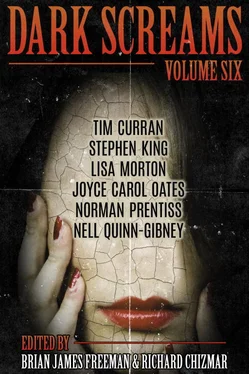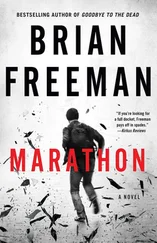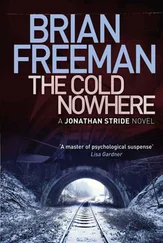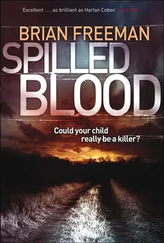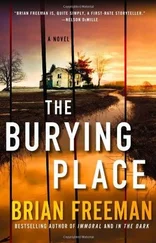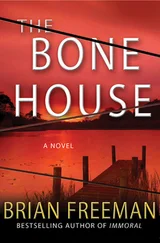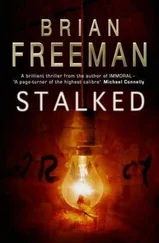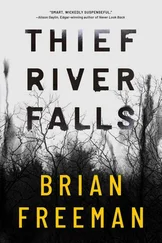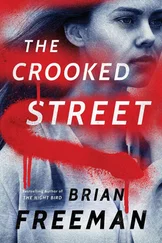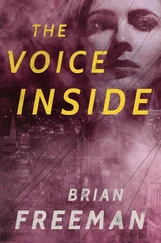They paused for a moment alongside the high brick walls of the Covenanter’s Prison, that ugly drab structure in the High Kirk that had once housed the Covenanters, the seventeenth-century Scottish Presbyterians who were persecuted by Charles II. December 7, 1666, they were hauled out of Haddock’s Hole, as they called the prison, and found guilty to a man. They were all sentenced to be hanged on the Mercat Cross in Edinburgh. As many as ten at a time had their necks stretched on a single scaffold. Afterward, they were dismembered, the individual pieces of their anatomy put on public display in the Covenanters’ own localities as a warning.
Nearby was the high, oval tomb of Sir George Mackenzie, the crown prosecutor against the Covenanters, who called him “Bloody Mackenzie.” Locally, the tomb was known as the Black Mausoleum and was reputed to be haunted, much as the prison itself.
Standing there in the shadows, Clow whispered, “Just wait a moment while I get me bearings. Have a chat with old Bloody George if ye wish.”
“No, I don’t speak with ghosts,” Kierney said. “Especially titled ones, they won’t give me the time of day… not that I blame them.”
“Nor I.”
Kierney pulled his hat off and wiped sweat from his brow. “Them poor Covenanters… me mother was a Presbyterian, I’m thinking.”
“Was she? I thought she was a whore.”
“Aye, she was, and a fine and sassy one at that. Prostitute… Presbyterian… I thought they was the same thing. Me poor education, I guess.”
“Enough with that now,” Clow said. “There were Presbyterians on me father’s side, I believe.”
“And fine ones they were.”
“Certainly. Highwaymen, the lot of ’em. Slitting gobs and stealing purses… God bless them one and all.”
After a moment they were off, following winding lanes and cutting among fifteenth-century fieldstone markers, riven tombs, and lichen-encrusted statuary: winged angels, sleeping lambs, and grinning skeletons wrapped in winding cloths. Tombstones were carved with raised cherubs, skulls-and-crossbones, and death angels gripping human skulls. The moon was thin-edged, the sky black with boiling clouds above.
Clow in the lead, Kierney following with the dog cart, they were in search of a fresh grave that belonged to a middle-aged woman who had passed just yesterday of a heart ailment. She had been very healthy up until then, the undertaker informed Clow for a few pence, and Dr. Gray would pay well, as he was currently researching cardiovascular diseases, especially those of a congenital nature that might, he thought, pass down family lines.
They kept moving, Clow only having the most general idea of where the grave was located. But he would find it, Kierney knew, and would keep casting about until he did so. It was his way. Like a bloodhound, Clow had an especially sensitive nose and he could smell fresh grave earth for a hundred yards.
Kierney looked behind them, always vigilant for the Churchyard Watch and maybe other things, too. He could see the squat and rising mural monuments at the edge of the churchyard flanked by the high flagstone buildings of Candlemaker Row. The tall chimneys and jagged roof peaks scratched against the clouds above. All the multipaned windows reflected bits of moonlight, but were all dark within.
“Quit lazying about,” Clow told him, “and bring that cart along.”
Clow had found the grave now, situated just beyond a wilted hedgerow in the shadow thrown by two crumbling sixteenth-century crypts. All the graves here were quite old, but there had been one plot of earth overlooked and perhaps the family thought their loved one would be unmolested in such a spot. As it was, the shiny new limestone slab stood out among the others, which were leaning and cracked and nearly unreadable with fingers of moss.
It was unguarded, as they had been told.
Down on his hands and knees, Clow expertly felt around the grave for tripwires that might lead to bombs or pistol harnesses or other booby traps. Such protective measures had cost the lives of dozens of unwary diggers. But the grave was clean.
“Quick about it, then,” Clow said.
Kierney drew up the dog cart and arranged what they would need. They unfolded a large tarp painted black and set it over wooden poles atop the grave. This lean-to would shelter them and the light of their lantern. He brought their tools inside and lit the hooded whale-oil lantern. Using prybars also of wood—the noise of iron against stone tended to carry—they edged the slab away from the grave. It was heavy, very heavy, but it was only a matter of leverage, experience had taught them. The only sound was their grunting and the slab grinding against the stone flange it was set on.
But soon it was clear.
The coffin was down only a few feet. Clay and stones had been arranged above to discourage resurrectionists, but they got through it all right, piling the dirt on a canvas sheet. They cleared it away in about ten minutes and broomed away the residue. Using screwdrivers, they unscrewed the lid, taking great pains to pocket each screw so it could be put back in later.
As Kierney was working the screws, a funny feeling began to come over him. It was not the stink of dank earth or buried things but an almost inexplicable sense that they were being watched. He couldn’t seem to shake it.
“Thought I heard something,” he told Clow, slipping from the tent with his pistol and studying the funerary grounds.
Nothing moved out there.
Nothing stirred.
Not even a leaf rustled.
There were lots of statues at Greyfriar’s, and seeing them gathered out there among the crowded tombstones draped with moonlight often gave the uninitiated a bit of a bad turn. But Kierney was seasoned. His eyes could immediately distinguish between inanimate forms and those only pretending to be so.
Nothing.
He knew instinctually that there was no one about. They were alone, and if the Watch was about, then they were far away. Though the air was damp and chill, he was sweating profusely once he entered the flaps of the lean-to again. Clow was taking out the last few screws.
“Ye playing with yer prick out there?”
“Aye, that I was,” Kierney said. “But it wouldn’t pay no mind to me hand, it prefers yours, and so it should.”
Clow laughed in his throat.
Kierney was sweating very badly now. Outside, the feeling of being watched had all but shrank away, but in here… Christ, it was all over him, practically screaming in his ears.
“Ye all right, Mick?”
“Aye, just getting the spooks for no good reason.”
“Well, quit yer fantasies about me poor Christian mother already. That’s what scaring ye. Me father near dropped dead of fright when she opened her legs to him. God as my witness, but there are certain horrors men were not meant to look upon.”
Kierney feigned a laugh,but could not shake the awful feeling that they were not alone. That there was another with them… unseen and unknown but close enough to touch.
Clow popped the last screw and put it and the screwdriver in the pocket of his frock coat. He worked his fingers under the lid of the box and pulled it up and up.
Kierney could barely breathe.
There was no smell of putrefaction or gas. Nothing. Just a dry smell of graveclothes and an after-odor of perfume. Nothing more.
The woman’s eyes were open.
There was a faint grayish pallor to her skin, but other than that she hardly looked touched by death. There was a vitality here that was strong and healthy, the cheeks just touched by pink. Her face did not have that compressed, sagging look that came with death. Her eyes were bright, not sunken in the least or filmed over.
“She’s not dead,” Kierney heard himself say.
Читать дальше
